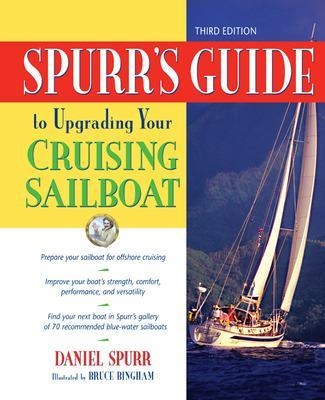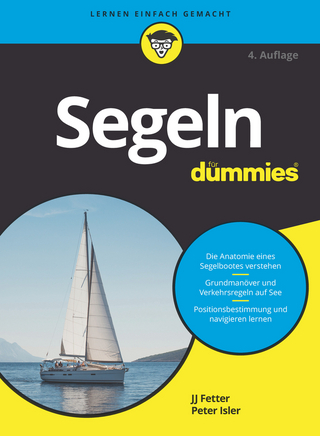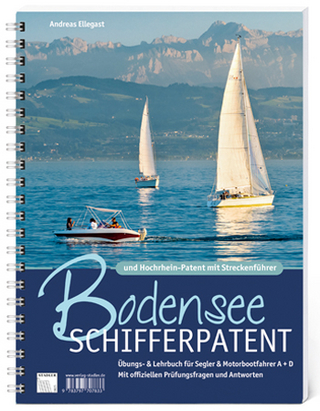
Spurr's Guide to Upgrading Your Cruising Sailboat
International Marine Publishing Co (Verlag)
978-0-07-145536-7 (ISBN)
Is your boat ready to go cruising?Just about every sailboat—used and new—can make a good cruiser, but only if the hull-deck structure, rig, and systems meet certain standards. Spurr’s Guide to Upgrading Your Cruising Sailboat tells you what those standards are, and gives you all the help you need to refurbish and upgrade every structure, surface, fitting, and system on your boat—stem to stern, project by project.This all-in-one guide leads you step by step to a seaworthy, crew-friendly boat with top-notch cruising performance. Not only will you learn what to look for when you buy a new or used boat, you'll also learn how to reinforce your boat’s hull and structural components, redesign and replace rigging, upgrade electrical systems, and much more. Special features include:
A detailed survey of 70 used and new fiberglass sailboats best suited to offshore sailingGear and equipment recommendations by brand nameConstruction details and other essential features of a strong, safe cruising boatHow to make critical repairs to the deck, hull, bulkheads, blisters, and portlights
Dan Spurr is the editor-at-large of Professional Boatbuilder magazine and the author of seven sailing books. He has been senior editor of Cruising World magazine and for twelve years was the editor of Practical Sailor, the consumer report of the sailing world, for whom he recently edited a book-length collection of sailboat reviews. He has owned and upgraded eight sailboats. Dan Spurr was for 12 years the editor of Practical Sailor newsletter, the “Consumer Reports” of sailing and one of the most respected boating publications, noted among other things for its new and used boat reviews, which have been published in book form as Practical Boat Buying. He is a former senior editor of Cruising World magazine and author of two highly regarded IM boating books as well as two critically acclaimed books of narrative nonfiction. He bought and refurbished his first fiberglass sailboat (a Pearson Vanguard) in the 1960s, and has since renovated three other boats including his current C & C 41. He is now the editor of Professional Boatbuilder magazine. AUTHOR HOMETOWN: Bozeman, Montana
AcknowledgmentsIntroduction to the Third EditionChapter 1 The Anatomy of a Cruising SailboatThe Cruising Imperatives; Design and Construction Considerations; Limit of Positive Stability; Multihulls; Hull Material; Rigs; Choosing a Boat; Further ReadingChapter 2 Strengthening Major Structural ComponentsIdentifying Weak Areas; Glass Fibers; Resins; Core Materials; Mold Release Agents; Distributing Stress; Health; Deck Reinforcements; Hull Flex; Hull-Deck Joints; Compression of the Deck at the Mast Step; Chainplates; External Reinforcements; Why I Hate Inner Liners; Reinforcing Rudders; Further ReadingChapter 3 A Seagoing Interior LayoutTypical Production Boat Layout; My Ideal Layout; Berths; Stowage; Head; Converting V-Berths to a Double Berth; Installing a Sink and Mirror in a Hanging Locker; Installing a Through-Hull Toilet; Installing a Top-Loading Icebox; Installing a Removable Table; Adding Bookshelves and Extra Storage Space; Recovering All Cushions; Replacing Curtains and Rods; Relocating Stoves; For Comfort and Safety; Disaster Checklist; Further ReadingChapter 4 Installing and Maintaining SeacocksTypes of Sea Valves; The Trouble with Gate Valves; Installing Seacocks; Electrical Bonding; Maintenance and Operation; Further ReadingChapter 5 Basic PlumbingTanks; Piping; Pumps; Freshwater Systems; Watermakers; Seawater Systems; Odds and Ends; Installing Pumps; Pump Maintenance; Further ReadingChapter 6 Steering SystemsTiller Steering; Cable Steering; Hydraulic Steering; Worm Gear; Rack and Pinion; Installation; Autopilot Adaptations; Emergency Steering Systems; Making an Emergency Rudder; Wind Vane Auxiliary Rudders; Weak Links in the Steering System; Further ReadingChapter 7 Self-Steering SystemsAutopilots versus Wind Vanes; Above-Deck Autopilots; Tiller-Mounted Autopilots; Below-Deck Autopilots; Wind Vanes; Wind Vane Adjustments; Self-Steering Expectations; Buying a Wind Vane; Further ReadingChapter 8 RepoweringGasoline Engines; Emergence of the Small Diesel; Going Engineless; Repowering; How Many Horses?; Fuel Capacity; Propeller Selection; Filters; Nonelectric Starters; Cutless Bearings/Stuffing Boxes; Sound Insulation; Further ReadingChapter 9 An Efficient Deck LayoutBowsprits, Platforms, Pulpits; Anchor Wells, Chainpipes, and Windlasses; A Complete Ground Tackle System; Lifelines, Stanchions, and Safety Lines; Requirements of a Seaworthy Companionway; Cleats; Mast Pulpits; Propane Tanks; Water Fills and Rain Catchments; Deck Drains; Making a Sea Hood; Cockpits; Life Rafts, Man-Overboard Poles, and Other Safety Equipment; Lights; Boom Gallows; Arches; Storm Shutters; Bulwarks; Protected Helm; Further ReadingChapter 10 Rigs and SailsTypes of Rigs; Spars; Spinnaker Handling Systems; Going Aloft; Standing Rigging; Inspecting Rigging; Running Rigging; Sails; Winches; Halyards, Cleats, and Clutches; Further ReadingChapter 11 Galley SystemsRequirements of a Good Galley; Types of Fuel; Installing an LPG System; Refrigeration; Contemplating Changes; Further ReadingChapter 12 Generating Electrical PowerBatteries; Measuring Electricity; Engine Alternators; Regulators; Making AC with Inverters and Fuel-Powered Generators; Water-Driven Generators; Wind-Driven Generators; Solar; Installation; Further ReadingChapter 13 Instruments and the Electrical SystemNavigation Instruments; Marine Radiotelephones; How Much Do You Really Need?; Electrical Bonding; Lightning Ground Protection; Some Basics About 12-Volt DC Electrical Systems; Installing Shore Power; Further ReadingChapter 14 Beating the Heat and ColdAir Conditioning; Heating; Simpler Solutions; Ventilation; Deck Prisms; Further ReadingChapter 15 Painting and VarnishingBottom Painting; Varnishes and Oils; Topside Painting; Fiberglass Restorers; Painting the Boat's Name; Further ReadingChapter 16 DinghiesHard versus Inflatable; Types of Inflatables; Production Dinghies; Building from Plans; Nesting Dinghies; Stitch-and-Tape Construction; Dinghy Stowage; Further ReadingAppendicesA. Characteristics of Common WoodsB. Characteristics of Common MetalsC. Good Old BoatsIndex
| Erscheint lt. Verlag | 16.5.2006 |
|---|---|
| Zusatzinfo | 350 Illustrations |
| Verlagsort | Rockport, ME |
| Sprache | englisch |
| Maße | 216 x 277 mm |
| Gewicht | 1143 g |
| Themenwelt | Sachbuch/Ratgeber ► Beruf / Finanzen / Recht / Wirtschaft |
| Sachbuch/Ratgeber ► Sport ► Segeln / Tauchen / Wassersport | |
| ISBN-10 | 0-07-145536-1 / 0071455361 |
| ISBN-13 | 978-0-07-145536-7 / 9780071455367 |
| Zustand | Neuware |
| Haben Sie eine Frage zum Produkt? |
aus dem Bereich


